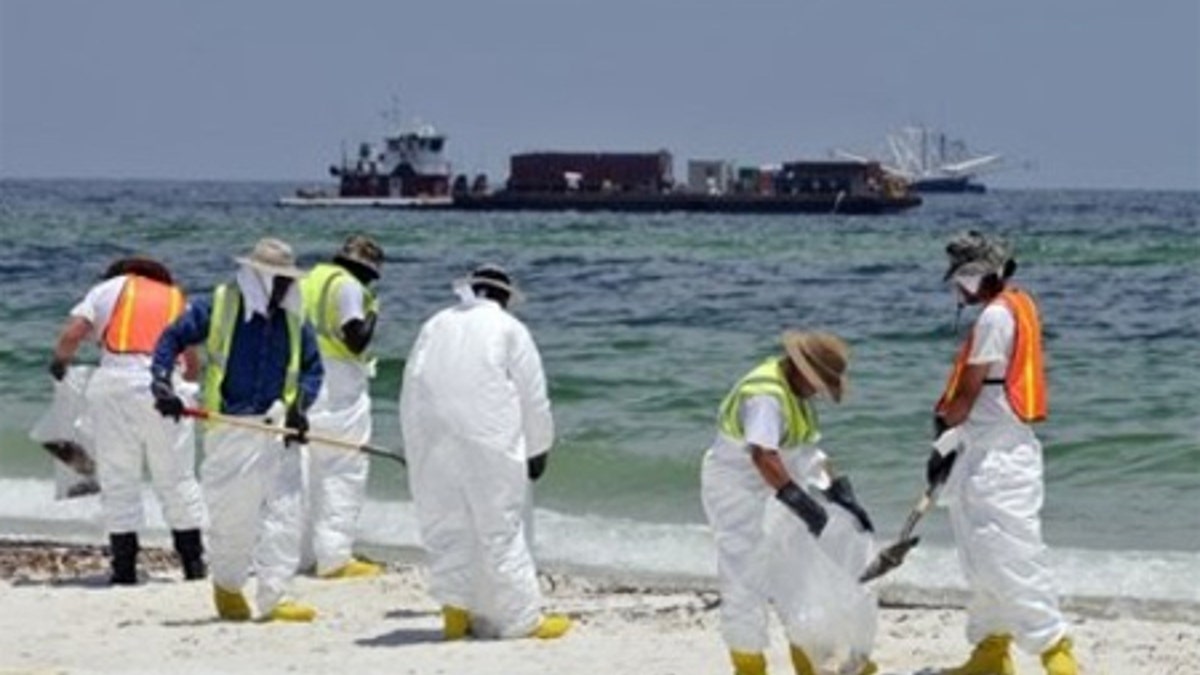
More than two months after the April 20 BP oil rig explosion in the Gulf of Mexico, experts are still trying to determine what the health effects will be on the workers who are struggling to clean up the biggest oil spill in American history.
There are concerns that some workers could suffer lung, kidney and liver damage from exposure to the volatile organic compounds found in the oil.
As of Wednesday, 407 oil exposure complaints had been reported to the American Association of Poison Control Centers. In Louisiana, more than 100 oil spill-related illnesses were reported, 74 of them from workers hired by BP.
“We've seen a total of 11 patients that have come through our ER since May 26, and most of them stayed for about two to three days,” Taslin Alfonzo, spokeswoman for West Jefferson Medical Center in Marrero, La., told FoxNews.com. “They all complained of similar symptoms, which were nausea, dizziness, severe headaches, skin irritation and shortness of breath, which is an indication — our doctors believe — there was some kind of chemical exposure or chemical irritant that caused them to come in.”
But exposure to toxic chemicals isn’t the only thing causing workers to seek medical attention. With the heat index in the Gulf hovering around 110 degrees during the steamy summer months, one of the main short-term health concerns is heat exhaustion.
"You really are talking about a triangle of heat, chemical exposure, and then the behavior changes that you see as a result," Linda McCauley, dean of Emory University's School of Nursing in Atlanta, said at an Institute of Medicine hearing in New Orleans this week.
Behavioral changes are just another layer of the health issues that could lie ahead for the workers cleaning up the Gulf. With many fishermen out of work in an area still reeling from the lingering economic and emotional damage left by Hurricane Katrina five years ago, the mental health of both the workers and the residents affected by this environmental catastrophe could be fragile.
“Individuals who have been directly affected by it, their livelihoods, their very way of life from generations, being told to terminate it at this point in time, and not being able to determine which steps they need to take,” Victor Sims, a clinical social worker and counselor at West Jefferson Behavior Medicine Center, told FoxNews.com.
It’s that type of situation that generates stress and anxiety, and then begins to exacerbate itself in changes in sleeping habits, changes in eating habits and other disorders based on their attempts to try and deal with this issue, he added.
On Wednesday, the United States Coast Guard reported the deaths of two oil spill workers in unrelated incidents.
One of the men, a 55-year-old boat captain, took his own life, the Gulf Shores Police Department said in a news release. William Allen Kruse, of Foley, Ala., was found above the wheelhouse of his boat at the Fort Morgan Marina in Gulf Shores, Ala., with a single gunshot wound to the head that appeared to be self-inflicted.
Medical screening for oil spill workers
BP is taking precautions to ensure workers meet the physical health requirements to work under such extreme conditions. In a partnership with West Jefferson Industrial Medicine, LLC, and West Jefferson Medical Center, the British oil giant has set up a medical screening clinic in Lafitte, La., where potential workers are examined and trained before being hired to work on the cleanup.
“People are having physical exams, which includes an examination, screening for previous medical history for conditions like diabetes, cardiac disease,” said Dr. Brian M. Bourgeois, owner of West Jefferson Industrial Medicine, LLC. “They’re also being screened for problems that may make working in the heat and humidity for long hours difficult, like vision problems and physical ability to do manual labor-type work.”
Another concern is the workers’ ability to work in an environment where they don’t necessarily have medical attention readily available, out in the open water, Bourgeois added.
For their part, community hospitals like West Jefferson have set up medical tents on the beaches of Grand Isle, La., where workers, first responders and volunteers are often seen between shifts.
“Initially we wanted to set it up for the oil spill workers, but BP is handling that now, and so we're mainly dealing with the first responders and anything that the community needs down there,” Alfonzo said.
Long-term health concerns
With $10 million set aside for tracking and surveillance of oil spill-related illnesses in states along the Gulf Coast, officials at the Department of Health and Human Services admit that little is known about the health impacts of oil spills on humans.
In the last 50 years, at least 400 spills have occurred around the world, yet only seven of them have been studied to date. Perhaps that’s why health officials on both the federal and local levels are now clamoring to implement health surveillance systems in Louisiana, Alabama, Mississippi and Florida.
The U.S. Centers for Disease Control and Prevention (CDC), the National Institutes of Health (NIH) and the Environmental Protection Agency (EPA) have been working with affected coastal communities to track cases of acute illnesses and trends in oil exposure-related hospital visits, medication sales and increases in certain diseases.
“What it’s going to do more likely than not, is maybe magnify preexisting conditions rather than being a causative agent for a new condition,” Bourgeois said.
In an effort to closely monitor potentially serious long-term effects of those with the most exposure to the toxic chemicals — the workers — the National Institute for Occupational Safety and Health (NIOSH) launched its own system. Of the nearly 35,000 BP oil spill response workers currently involved in the cleanup effort, 14,664 workers have volunteered to be part of the long-term tracking system.
Nicole Aber and Reuters contributed to this report.
